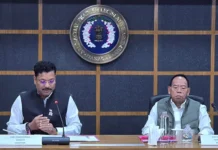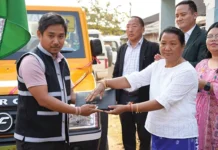RONO HILLS, 22 Mar: The three-day lecture series on ‘Nation, icons and peace’, organized by the Rajiv Gandhi University (RGU) International Centre for Gandhian and Peace Studies, in collaboration with seven departments of RGU, Tamil Nadu-based RGNIYD, and Hyderabad (Telengana)-GKF concluded on 20 March with a session titled ‘A conversation with the apostle of truth’.
The three-day programme included book excerpt reading from The Story of My Experiments with Truth by RGU research scholar Tokmem Dai, poetry reading by Chayanika Saikia from the department of Hindi, poetry reading by Manas Pratim Borah and Akuta Mega (department of English, RGU) on the life of Mahatma Gandhi to exhibit the principles of satyagraha and peace.
A real-time live art of Gandhi was also made by Hibu Tamo, a fourth semester student of RGU’s fine arts and music department.
Managing trustee and secretary of the GKF, Prof Gollanapalli Prasad elaborated the life, vision and mission of Mahatma Gandhi. He defined the meaning of himsa (violence) and ahimsa (non-violence) in every aspect of life.
He further informed that the Gandhi King Foundation is going to start a department in RGU soon.
RGU Vice Chancellor Prof Saket Kushwaha explained the meaning of ‘Nation, icon and peace’ with relevant examples to the school students.
RGU’s International Centre for Gandhian and Peace Studies coordinator, Prof SN Singh, also spoke.
On 19 March, the second session focused on the relevance of Bhagat Singh as a major icon in the context of the Indian freedom struggle.
RGU Pro-VC Prof Amitava Mitra dwelt on the contribution of Bhagat Singh to the success of the freedom struggle, and his respect for Mahatma Gandhi, whose method of non-violence he said he considered to be “the most appropriate method of resisting the colonial dispensation.”
The chief speaker, Prof Prasad spoke on Bhagat Singh and his impact on shaping the modern Indian collective imagination. He further elaborated the ideas and ideals of Bhagat Singh impacting the youth of India “to help rebuild a syncretized nation to achieve self-sufficiency and its due place in the international community.”
Referring to an MoU signed with the GKF, RGU Registrar Dr NT Rikam said that “it will bring out more collaborative research activities to unearth significant roles the important national icons have at different times played to secure freedom for us and to give us a proper blueprint for nation-building in the post-independence phase.”
History HoD Prof Assan Riddi spoke on the contributions of the department of history in conceptualizing and materializing the establishment of the centre, “whose meritorious involvement in roping in international scholarship on Gandhian non-violent methods for a peaceful world deserves appreciation.”
A prize distribution ceremony for the drawing competition held earlier in RGU’s campus school was also held.


